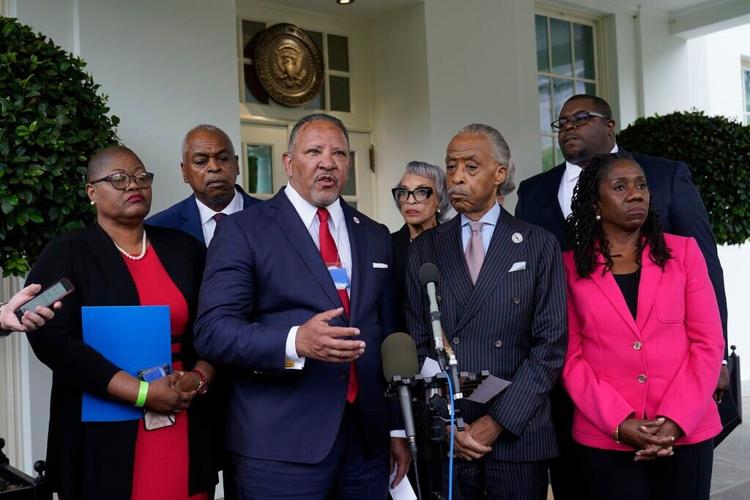Marc Morial comes home to New Orleans so often that many people in Louisiana may think he never left.
But he's been gone a long time.
, Morial served first in the Louisiana Senate and then as New Orleans mayor for two terms, 1994-2002. Twenty years ago this month, he became president and CEO of the National Urban League in New York City.
Cy Richardson was a junior program manager the day the new boss arrived. From Day One, Richardson told me, Morial made it clear the wouldn't be the same.

1.) Anthony Mumphrey 2.) Bob Tucker 3.) L-r, Mayor elect, Marc Morial and Mayor Sidney Barthelemy in the Mayor's office. This picture was taken just before the two met to discuss the transition. 4.) L-r, Mayor elect, Marc Morial and current mayor, Sidny Barthelemy answers question during a transition press conference. Monday, March 7, 1994
"It was a night-and-day organizational culture change," recalled Richardson, now senior vice president for economic development and housing programs. "Institutions take on the personality of their leaders. ... Marc provided a great urgency ... the urgency of now."
Morial has been so hard-charging, so clear with high expectations, Richardson said, that "some people couldn't keep up."
He made significant changes. The League moved from a program-oriented organization to a program-and-advocacy force for good. Morial insisted the League couldn't just talk about what it did; it needed data. Metrics became the standard. Numbers justified the League's important work — and helped it raise money.
Morial returns frequently to New Orleans to visit his mother, other family and friends, and to attend special events several times a year. Jazz Fest. Essence Festival. Christmas.
Before the COVID-19 pandemic, Morial traveled about 250,000 air miles annually, visiting local chapters and taking the League's message and work across the country.
The National Urban League has had high-profile leaders throughout its history. Recent generations might remember Whitney M. Young Jr., Vernon E. Jordan Jr., John Jacobs and Hugh Price, the man Morial succeeded.
Morial, however, is the first to lead the League for 20 years or more since the League's first two directors, Eugene Kinckle Jones (1918-41) and Lester Granger (1941-61). Jones and Granger had the task of combining three separate groups into a single organization focused on .
According to Morial, the League had less than $1 million when he started. He and his team grew endowments to about $112 million today. The League has 93 affiliate chapters in 36 states and Washington, D.C., serving about 3 million people annually. He is proud that the League remains at the center of civil rights conversations, something his board wanted when they hired a politician with civil rights chops.
Melanie Campbell, president and CEO of The National Coalition on Black Civic Participation, works to increase voter engagement in Black and underserved communities. Her work often coincides with Morial's. She's part of a civil rights coalition that regularly discusses critical issues such as Thursday's disappointing U.S. Supreme Court decision gutting collegiate affirmative-action programs.
"Marc has been my brother in the civil rights, economic, and social justice movement for over 25 years," Campbell shared. "I have seen firsthand Marc's unique leadership and commitment to advancing civil rights and uplifting Black women's leadership. He is also a role model for Black men and youth everywhere. In his 20 years as the leader of the National Urban League, he has made a significant impact on our community and the nation."
Morial said he "loved every minute" of his job as mayor, and it breaks his heart to see some of the things that have happened in the last two decades. But he's in a different line of work these days — and he's on a national stage.
Other former elected officials like U.S. Reps. Kweisi Mfume, of Maryland, and William Gray III, of Philadelphia, left elective office to lead the NAACP and the United Negro College Fund, respectively.
But few have matched Morial's long tenure at the helm of a national civil rights organization.
Morial continues his work with his eye on the future — negotiating agreements to advance Black causes with the likes of Comcast NBC Universal, Charter and T-Mobile. He announced to house the National Urban League headquarters, major retailers, nonprofit office space and 170 affordable housing units on West 125th Street, not far from Marcus Garvey Park. "We're returning home," he told me.
Morial has no plans to slow down or leave the National Urban League. "I'm just getting started," he said with a wry smile. "As long as the Lord is willing ... I'm not the retiring type."
Meanwhile, he'll continue to make waves nationally — and perform public service the way he learned it at home.













